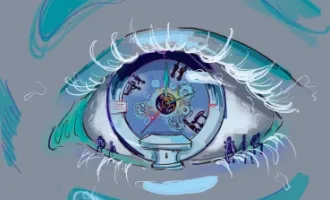Playing At God: A Comedy
Editor's note: Shakkaura Kemet earned an honorary mention in the Synapse Storytelling Contest for this submission.
Class play is a traditional aspect of med school at UCSF in which second year medical students put on a play of sorts for first year medical students that highlight salient and usually-funny aspects of medical school culture.
The part of this year’s play that everyone still speaks about all the time is video footage of staged patient encounters. In the first weeks of med school, members of our class were offered a chance to get some extra clinical skills training.
Little did they know, second year med students had set up incredibly uncomfortable patient encounters for the new first years.
The video recordings from those encounters were played as part of class play. By far, the one that got the most laughs was a scenario in which a female standardized patient repeatedly gives unwanted and unsolicited sexual attention to a male first-year med student attempting to complete a history and physical exam.
As soon as the video clip started the audience began to laugh and scream. A woman sits on the exam table in a trench coat and long black leather boots.
She is the American archetype for feminine sexuality, and even though the medical student has not yet entered the room we all know exactly how this scene will play out.
This standardized patient is going to create sexual tension during the exam, and the medical student is going to try his best to complete the exam no matter what she does. He won’t leave the room.
He won’t even directly tell her that what she is doing is inappropriate or that it makes him uncomfortable. It won’t even occur to him.
His job as an aspiring physician is to see to her health care needs regardless of whether or not he is comfortable while he does it. His job is not only to save lives. It’s to save lives regardless of personal cost.
The standardized patient begins her sexual harassment slowly. At first her tone is merely suggestive. Her eyes rake over the student as though she is undressing him mentally.
When the student attempts to listen to her heart with a stethoscope, seeking to ensure that she does not have a fatal pathologic heart sound, she leans into him and asks if he is married with a breathy whisper.
The medical student attempts to redirect the conversation and neutralize her suggestive comments about his appearance, all while trying to listen for a heart murmur he has never actually heard before, remember correct draping to protect her privacy and comfort, remember the mnemonics for eliciting a social history so as not to forget a diagnosis-altering detail, and show empathy to a woman who clearly does not care to return the favor.
As the encounter continues the patient repeatedly demands a breast exam, coerces the medical student into removing her thigh-high leather boots, and forces him to make a comment about her lingerie.
By the end of the video clip the peals of laughter coming from the audience are so loud that it is impossible to hear what is being said. But we don’t need to hear or see the rest of the clip to know how it ends.
We all know that the medical student did the impossible. He attempted to safeguard the patient’s health at great cost to his own comfort and wellbeing.
He probably hasn’t even really considered the idea that he is experiencing sexual harassment. He is too concerned about the presentation he will have to give to his preceptor after this patient interaction.
Would the preceptor even believe him if he said what happened in the clinical encounter? Would the preceptor care? Would they even think it was sexual assault given the gender dynamics?
Would the preceptor perhaps even regard the student as unprofessional or lacking in bedside manner for failing to successfully complete the patient history regardless of this extenuating circumstance?
It’s not really the patient’s job to make our work easy for us, right? After all, we are the ones with the years of training and white coat privilege in this situation.
Aren’t the most admirable doctors the ones who find a way to provide care regardless of the obstacles presented?
C’mon fancy med student. You managed to get into one of the best medical schools in the country, right? Figure it out.
How curious that this is our response to seeing sexual harassment in the work place. During class play we laughed because we knew the situation we were watching was artificial, but also because we knew it was not.
We are trained to leave ourselves outside the doors of our patient’s rooms. Once we enter a clinical encounter we exist solely to aid the patient. In anticipation of this we are even armed with tools for dealing with “difficult” patients.
We are trained to politely redirect the conversation when patients ask us about ourselves, trained to use the term “palpate” and not “touch” so as not to evoke the stirring of human intimacy the latter word implies, and trained weigh the risks of wearing pins on our white coats that communicate political leanings lest they upset a patient.
All of this to avoid making even the slightest implication that physicians are complete human beings with wants and needs like any other, or that we deserve even a fraction of the basic human consideration we are trained to give when we see our patients.
And so we find ourselves in a situation where sexual harassment is laughable, even in the midst of the nationwide #MeToo movement.
After all, what else can we do but laugh at the horrible risk at which we all feel compelled to put ourselves on a daily basis? Since we have committed to privileging patient well-being above our own, it naturally follows that sometimes we will suffer.
The question is not if, but when. We often speak of the physician God complex as the detestable disposition of narcissistic doctors, but another aspect of the physician-as-God myth is that when we do suffer in very human ways we must suffer in silence.
Or maybe, we suffer in laughter.



